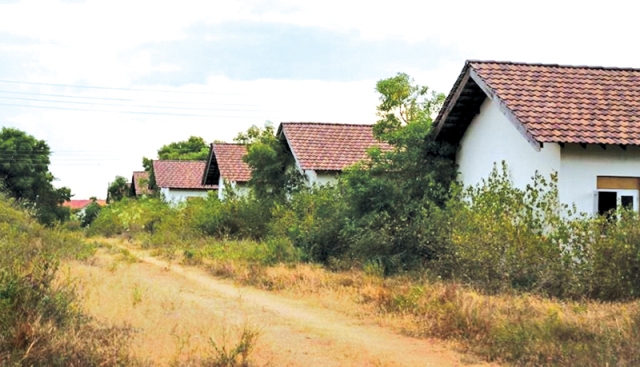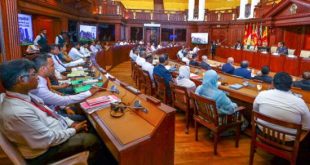 The Bodu Bala Sena, which is an organization that seeks to protect the rights of the Buddhist majority, has issued a ten point manifesto directed against Muslim religious practices that they claim are impinging on the rights of non-Muslims. Chief amongst these is the issuance of Halal certification of consumer products for a fee. A recent public rally in the suburban Buddhist stronghold of Maharagama attracted over 2000 Buddhist monks and several thousand other supporters.
The Bodu Bala Sena, which is an organization that seeks to protect the rights of the Buddhist majority, has issued a ten point manifesto directed against Muslim religious practices that they claim are impinging on the rights of non-Muslims. Chief amongst these is the issuance of Halal certification of consumer products for a fee. A recent public rally in the suburban Buddhist stronghold of Maharagama attracted over 2000 Buddhist monks and several thousand other supporters.
The recent upsurge of anti-Muslim sentiment, and its open manifestation amongst sections of the ethnic majority
population, has come as a shock and hurt to Muslims. They are very much concerned that their community and its practices are being unfairly maligned. But they have not resorted to public protests, preferring instead to sort things out through quiet diplomacy.
Muslims in Sri Lanka had believed themselves to be integrated into the mainstream of society. Muslims are well represented within the government unlike the Tamils who are the larger ethnic minority community. Muslims see their community as having made significant sacrifices on behalf of the country. The fact that the second largest minority community has stood steadfastly for a united and undivided Sri Lanka has been a major source of strength to successive Sri Lankan governments. The Muslims have consistently refused to be joined together with the Tamils as being part of a larger category of “Tamil-speaking people.” This has included being part of the government’s diplomatic initiatives with the international community. During the war they were seen as a source of support and information to the government in its military campaign against the LTTE.
On this last count, the Muslims, especially those living in the former war zones of the North and East, have paid a heavy price. The worst incidents affecting them took place in the early 1990s as the strategy of the LTTE shifted from one that relied primarily on hit and run operations befitting a guerilla movement, to one of capturing territory and holding on to it in the manner of a conventional military force. The LTTE was on the ascendant at that time, and therefore they were all the more frustrated by their inability to win the support of the Muslims for their cause of an independent state of Tamil Eelam, which would be under Tamil control. The culmination of this failure was the forcible expulsion of the entire Muslim population living in the North and an attempt to cause the Muslims of the East to also flee by brutally killing hundreds of them in their mosques.
ABYSMAL FAILURE
So far the anti-Muslim campaign being currently undertaken by groups such as the Bodu Bala Sena is not being challenged publicly by any significant section of the polity. Both government and opposition spokespersons have been relatively non-committal on the issue of Halal certification saying that the government should issue the certificate rather than the Muslim religious authorities. The unwillingness of the political parties to speak up and make a critique of the anti-Muslim propaganda is one indication of the abysmal failure of post-war reconciliation. If during the war it was believed that inter-community tensions were due to the acts of hateful violence and terrorism, after the end of the war there are no such acts of terrorism. But inter-community relations have sharply deteriorated and, though the war is over nearly four years, the sense of vulnerability of the different ethnic communities remains high.
Although those who champion causes of nationalism often claim their motivation to be love of the nation or the motherland, the passion behind them is often hatred and fear of those deemed to be outsiders. All three of the country’s main communities feel themselves to be vulnerable even in post-war Sri Lanka. The feelings of vulnerability on the part of the Tamils is to be expected, as they lost the most during the years of war, and the failure of the government to adequately implement the recommendations of the Lessons Learnt and Reconciliation Commission cannot be a reassurance to them any more than it is to the international community that urged their implementation at the UN Human Rights Council session in Geneva last year. Now the Muslims feel themselves to be vulnerable due to the efforts of organizations such as the Bodu Bala Sena.
What is ironic is a sense of vulnerability that pervades the Sinhalese consciousness also. This derives from the government’s public posture that the country is under assault by Western governments who are being unduly influenced by the Tamil Diaspora. It does not require any big leap of the imagination in these circumstances for many in the Sinhalese community to imagine that the Muslims too have ulterior plans of their own which are backed by the might of the Muslim countries and various Islamic movements in the world. The basic problem is that the government has continued to exploit ethnic majority nationalism in order to secure its voter base, and groups like the Bodu Bala Sena are ultimately a part of the support base of the government. This is why President Mahinda Rajapaksa and other government leaders are able to have dialogues with them and put pressure on them not to take their campaigns too far.
PERSONAL DIALOGUE
A fortuitous discussion I had in a village near Galle last week, where I went to attend a social function, may give an indication of the apprehensions and concerns that are spreading within the Sinhalese community. My conversation partner was a Buddhist monk who was a close relative of the family whose house I had visited, and who felt he could talk freely and express his opinions. He started by asking me what I thought about the Halal issue. When I said that it was not compulsory for non-Muslims and it was advantageous for commercial businesses to get the certification, and therefore I did not see it as anything threatening, he reminded me of the fate of Afghanistan, Pakistan and Iran. I thought he was going to tell me about big power politics in the present age, and the role played by the United States in adding to the problems in those countries. But what he said was entirely different.
What the monk had to say was that those West Asian countries had once been Buddhist, and now were totally Muslim. He expressed fear that the same fate could befall Sri Lanka in the years to come. He said that the revenues earned by Muslim religious organizations by issuing the Halal certificates for a fee were being used to propagate Islam. He also spoke about Muslim shop owners who hired Sinhalese girls to work in their shops, and then would introduce them to Muslim men who would marry them. He also gave an account of a Muslim-owned shop that sold undergarments with the Buddha image on them. He said that he had received more information through a pamphlet that had been given to him, and to other Buddhist monks, at an almsgiving ceremony he had attended. It seems clear that there is a grassroots level disinformation campaign taking place that will surely influence the thinking of the Sinhalese majority unless it is countered.
One possible way for the Muslim community to help in defusing the crisis would be to make the issuance of Halal certificates free of charge for items sold within the country. It is this issue that appears to have struck a chord with the Sinhalese masses, perhaps because of its economic implications. But there is also a need for an educational campaign to counter the disinformation at the community level. The government has every reason not to permit the polarization and flow of rumours to escalate to the point of mob violence. As Sri Lanka’s experience of anti-minority riots shows, once the mobs get going it becomes very difficult for governments to rein them in. Any violence towards the Muslim community would prove to be disastrous to the government’s hopes of Sri Lanka’s progress to the ranks of the developed world. There will be less support for the government coming from the Muslim countries in international forums which the government needs to stave off international sanctions.
Post Disclaimer | Support Us
Support Us
The sailanmuslim.com web site entirely supported by individual donors and well wishers. If you regularly visit this site and wish to show your appreciation, or if you wish to see further development of sailanmuslim.com, please donate us
IMPORTANT : All content hosted on sailanmuslim.com is solely for non-commercial purposes and with the permission of original copyright holders. Any other use of the hosted content, such as for financial gain, requires express approval from the copyright owners.
 Sri lanka Muslims Web Portal Sri Lanka Muslims News Center
Sri lanka Muslims Web Portal Sri Lanka Muslims News Center
 Donate
Donate



The Muslims of Sri Lanka has stood with Successive Governments through ” Thick and Thin”, on many occasions sacrificing with their lives and their properties and all their belongings and languished in refugee camps for several years and are still languishing in such horrible conditions. All for the Sake of Mother Lanka for its UNITY AND SECURITY
The Muslims are Sincere, honest and loyal people and they have always stood for the Unity of the Motherland- SRI LANKA- we will live and die in our Motherland.
The major Political parties like SLFP, UPFA, UNP, LSSP, SLMP and the Neo-Nationalist Sinhala Buddhist parties like the JHU and other similar parties should look at the history of the Muslims and their contribution to the Motherland and their sacrifices and COME TO THE FORE AND DEFEND AND COUNTER THE DISINFORMATION CAMPAIGNS AND THE ANTI-MUSLIM SLOGANS THAT ARE BEING TOUTED FREELY AND IGNORANTLY, QUITE unfortunately by the Buddhist clergy!!
This is quite sad. We really pity their ignorance.
However, IT IS THE RESPONSIBILITY OF THE GOVERNMENT AND ALL MAJOR POLITICAL PARTIES TO COUNTER ALL THESE ANTI-MUSLIM CAMPAIGNS AND CREATE A PEACEFUL ATMOSPHERE FOR CITIZENS OF THIS CUNTRY,
whether, Sinhalese or Tamils or Muslims or Burghers and Malays and Parsees to live in PEACE in the land of their birth and the land of their forefathers. This Land belongs to all of US